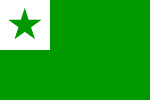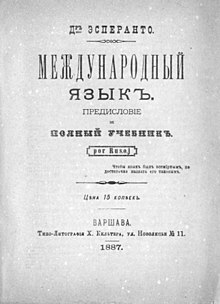Esperanto
| Esperanto | |
|---|---|
 The banner o Esperanto | |
| Creautit bi | L. L. Zamenhof |
| Date | 1887 |
| Settin an uissage | Internaitional auxiliary leid |
| Users | estimatit 30,000 tae 180,000[1] (2017) |
| Purpose | |
| Soorces | maistly basit on the European leids |
| Offeecial status | |
| Regulatit bi | Akademio de Esperanto |
| Leid codes | |
| ISO 639-1 | eo |
| ISO 639-2 | epo |
| ISO 639-3 | epo |
epo | |
| Glottolog | espe1235[2] |
| Linguasphere | 51-AAB-da |
Esperanto is the maist widely spoken constructit internaitional auxiliary leid. Its name derives frae Doktoro Esperanto (Dr. Hopeful), the pseudonym unner which L. L. Zamenhof publisht the first beuk detailin Esperanto, the Unua Libro, in 1887. Zamenhof's goal wis tae creaut an easy-tae-learn an politically neutral leid that wad serve as a universal seicont leid tae foster peace an internaitional unnerstandin.
Esperanto is the ae constructit leid wi native speakers, that is, fowk who learned it frae thair parents as ane o thair native leids. Estimates range frae 10,000 tae twa million additional active or fluent speakers. Uisage is parteecularly hie in eastren an northren Europe, eastren Asie, Brazil, an Iran. A Warld Congress o Esperanto wis organized in Fraunce in 1905, an syne then haes been held in various kintras ivery year apairt frae durin the warld wars. Awtho nae kintra haes adoptit it offeecially, Esperanto wis recommendit bi the French Academy o Sciences in 1921, wis recognised bi UNESCO in 1954, an is currently the leid o instruction o a varsity in San Marino. Thare is evidence that learnin Esperanto mey provide a superior foondation for learnin leids in general, an some primary schools teach it as preparation for learnin ither foreign leids.
History
[eedit | eedit soorce]
Esperanto wis creatit in the late 1870s an early 1880s bi Dr. Ludovic Lazarus Zamenhof, a Roushie-Jewish ophthalmologist frae Bialystok, at the time pairt o the Roushie Empire. Accordin tae Zamenhof, he creatit this leid tae foster harmony atween fowk frae different kintras. His feelins an the situation in Bialystok mey be gleaned frae an extract frae his famous letter tae Nikolai Borovko:[3]
The place whaur A wis born an spent ma childhuid gave direction tae aw ma futur struggles. In Bialystok the inhabitants wur dividit intae fower distinct elements: Roushies, Poles, Germans an Jews; each o these spoke their awn leid an leukt on aw the ithers as enemies. In such a toun a sensitive nature feels mair acutely than elsewhaur the misery caused bi leid diveesion an sees at ivery step that the diversity o leids is the first, or at least the maist influential, basis for the separation o the human family intae groups o enemies. A wis brought up as an idealist; A wis taught that aw fowk wur brithers, while outside in the street at every step I felt that there were no people, only Russians, Poles, Germans, Jews and so on. This wis awways a great torment tae ma infant mynd, although mony fowk mey smile at such an 'anguish for the warld' in a child. Since at that time A thought that 'grown-ups' wur omnipotent, so A aften said tae masel that when A grew up A woud certainly destroy this evil.
— L. L. Zamenhof, in a letter tae N. Borovko, ca. 1895
Efter some ten years o development, which Zamenhof spent translatin literature intae Esperanto as well as writin oreeginal prose an verse, the first beuk o Esperanto grammar wis publisht in Warsaw in Julie 1887. The nummer o speakers grew rapidly ower the next few decades, at first primarily in the Roushie Empire an Eastern Europe, then in Wastren Europe, the Americas, Cheenae, an Japan. In the early years, speakers o Esperanto kept in contact primarily throu correspondence an periodicals, but in 1905 the first warld congress o Esperanto speakers wis held in Boulogne-sur-Mer, Fraunce. Syne then warld congresses hae been held in different kintras ivery year, except durin the twa Warld Wars. Syne the Seicont Warld War, thay hae been attended bi an average o ower 2,000 an up tae 6,000 fowk.
Zamenhof's name for the leid wis simply La Internacia Lingvo "the Internaitional Leid".[4]
Vocabular
[eedit | eedit soorce]Its vocabular is maistly taen frae Romance soorces, wi a simplifee'd gremmer an an agglutinative morphology that maks wird-creation eith. The spellin o Esperanto wis designed tae be haillie conseistent an aa, altho Zamenhof felt this needit the creation o sax new letters: ĉ [ʧ], ĝ [ʤ], ĥ [x], ĵ [ʒ], ŝ [ʃ], an ŭ [w].
Exemplars
[eedit | eedit soorce]- Hello: Saluton /saluton/
- Whit lik?: Kiel vi fartas? /kiel vi fartas/ (literally "Hoo ar ye farin?")
- A'm daein fine, thanks: Mi fartas bone, dankon /mi fartas bone dankon/ (literally "A'm farin weel, thanks")
- Dae ye spaek Scots (Inglis)?: Ĉu vi parolas la skotan (la anglan)? /ʧu vi parolas la skotan (la anglan)/
- See ye efter: Ĝis (la) revido /ʤis (la) revido/ (literally "Till (the) re-seein")
References
[eedit | eedit soorce]- ↑ 63,000 −50%/+200%: "Nova takso: 60.000 parolas Esperanton" [New estimate: 60.000 speak Esperanto] (in Esperanto). Libera Folio. 13 Februar 2017. Retrieved 13 Februar 2017.
- ↑ Nordhoff, Sebastian; Hammarström, Harald; Forkel, Robert; Haspelmath, Martin, eds. (2013). "Esperanto". Glottolog. Leipzig: Max Planck Institute for Evolutionary Anthropology.
- ↑ The letter is quoted in Esperanto - The New Latin for the Church and for Ecumenism, by Ulrich Matthias. Translation from Esperanto by Mike Leon and Maire Mullarney
- ↑ "Archived copy". Archived frae the original on 22 Juin 2011. Retrieved 3 December 2010.CS1 maint: archived copy as title (link)
Airtins tae fremmit steids
[eedit | eedit soorce]- La Lingvoj de Skotlando Archived 2005-11-08 at the Wayback Machine (The Leids o Scotland). An airticle in Esperanto anent Inglis, Gaelic an Scots.
- The Auld Scots Tongue and Esperanto Archived 2006-07-09 at the Wayback Machine Airticle anent Esperanto in the Scots leid
- Diskutgrupo "Ni parolas Esperante" Archived 2013-12-22 at the Wayback Machine
| Wikimedia Commons haes media relatit tae Esperanto. |
